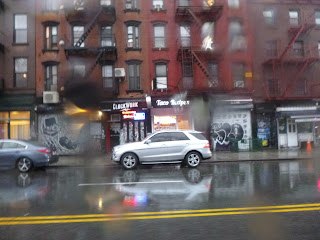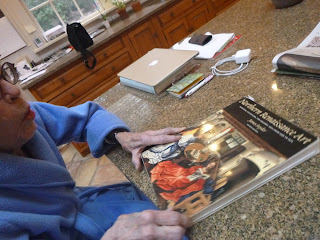air photo of don quixote by catherine talese, who writes:"fantastic conversation today on Part I of Don Quixote! Thanks AIR and Joan E. Roney Benjamin Heim Shepard Emily Schuch Julie Mcclelland Barrett Vicki Cerrud for diving deep into themes of class, gender, and reality in today's discussion!"
Rainbows 🌈 & Kitty views from Cervantes Don Quixote AIR book club .... believe the impossible dreams.... @ Lower East Side"
For the last few weeks, we’ve all been chasing windmills.
Some losing our minds.
That’s what living here is all about…
Looking for democracy
amidst the ruins.
Embers burning.
“When life itself seems lunatic, who
knows where madness lies?” writes Don Quixote.
“Perhaps
to be too practical is madness. To surrender dreams — this may be madness. Too
much sanity may be madness — and maddest of all: to see life as it is, and not
as it should be!”
Certainly Quixote
does,
Poking his head
into the story,
Suggesting windmills
can be more than they appear.
Cervantes reminds
us there’s more out there for us,
if we look a
little closer, without reality getting in the way.
Reading it, ideas
move forward and backward,
Through countless
cultural touchstones.
From Monty Python
Movies to Borges stories to Kundera novels,
That came here
first.
Cervantes seems
to everywhere.
Reading it is
like seeing my world with a map I never knew,
Connecting stories
and novels, movies and road trips,
and ideas leagues
of writers would appropriate throughout the history of literature.
“When Don Quixote went out into the world, that world turned into a mystery before his eyes. That is the legacy of the first European novel to the entire subsequent history of the novel. The novel teaches us to comprehend the world as a question. There is wisdom and tolerance in that attitude,” writes The Book of Laughter and Forgetting.
Caroline Hellman, who masterfully writes
about the invisible road maps between stories, referred to Melville invoking Cervantes:
“If, then, to meanest mariners,
and renegades and castaways, I shall hereafter ascribe high qualities, though
dark; weave round them tragic graces; …the stumped and paupered arm of old
Cervantes..”
Written in the backdrop of the Inquisition,
Cervantes has nothing to lose.
He sold his land to buy books.
It’s a book in praise of books, notes Catherine during
our book group chat on the text.
Why did you pick this as a topic, I ask.
You picked it.
I thought you did.
We all did.
What is madness or sanity or event reality?
I am not even sure Quixote did any of this?
Was he dreaming, at home imagining away?
Whether it’s a hallucination or a Netflix movie, Quixote and
Sancho are working through questions about reality, chivalry, or friendship.
“Don Quixote and Sancho really listen to each other,” writes Harold
Bloom in the introduction to Grossman’s magisterial translation. “[T]hey change
through this receptivity. Neither of them
overhears himself, which is the Shakespearean mode. Cervantes or Shakespeare: they are real
teachers of how we change and why.
Friendship in Shakespeare is ironic at best, treacherous more
commonly. The friendship between Sancho
Panza and his Knight surpasses any other in literary representation.”
Reading the novel, one uncovers a history of ideas, empires
in decline, chasing windmills, the imagination meandering, humans interacting
with shadows dreams, others and themselves.
Catherine follows, quoting
from the
prologue:
"Let it be your aim that, by reading your story, the melancholy may be moved to laughter and the cheerful man made merrier still; let the simple not be bored.. let the grave ones not despair you, but let the prudent praise you."
"Let it be your aim that, by reading your story, the melancholy may be moved to laughter and the cheerful man made merrier still; let the simple not be bored.. let the grave ones not despair you, but let the prudent praise you."
A exploration of the road, the
work is also a meditation on the nature of love.
Catherine points to Chapter XIV: Marcela's monolog on the obligations of
beauty
.
Scene: at the burial of Grisóstomo, a shepherd who dies of unrequited love. All present agree that Marcela, the wealthy and beautiful woman who he adored, is a cruelty temptress, a wild beast and a basilisk.
.
Enter: Marcela, All receive the radiance of her beauty and scorn her.
Her speech.
.
"Heaven made me beautiful, you say, so beautiful that you are compelled to love me whether you will or no; and in return for the love that you show me, you would have it that I am obliged to love you in return."
.
"Those who have been enamored by the sight of me I have disillusioned with my words; and if desire is sustained by hope, I gave none to Grisóstomo or any other, and of none of them can it be said that I killed them with my cruelty, for it was rather their own obstinacy that was to blame."
.
Scene: at the burial of Grisóstomo, a shepherd who dies of unrequited love. All present agree that Marcela, the wealthy and beautiful woman who he adored, is a cruelty temptress, a wild beast and a basilisk.
.
Enter: Marcela, All receive the radiance of her beauty and scorn her.
Her speech.
.
"Heaven made me beautiful, you say, so beautiful that you are compelled to love me whether you will or no; and in return for the love that you show me, you would have it that I am obliged to love you in return."
.
"Those who have been enamored by the sight of me I have disillusioned with my words; and if desire is sustained by hope, I gave none to Grisóstomo or any other, and of none of them can it be said that I killed them with my cruelty, for it was rather their own obstinacy that was to blame."
Can we see others on more honest terms, instead of projecting
our ourselves, needs, and fears onto them?
Love thy enemy, implores
Matthew.
Catherine posted Cervantes quotes
all week long, wondering about
Don Quixote:
Chapter VI
“What happens when a priest, a farm girl, a barber and a housekeeper walk into a library and are determined to burn all those sinful books at the stake?
“What happens when a priest, a farm girl, a barber and a housekeeper walk into a library and are determined to burn all those sinful books at the stake?
For Cervantes, the scene turns into a discourse on the Golden
Age of Spanish literature and a primer on what merits literary praise; a well
conceived story? narrative inventiveness? polished prose and clear dialogue?
well observed characters? Or is it the realism?”
It’s a book about going nuts, reading too many novels, hand
in hand, the ever evolving narrator inserting Cervantes into his metafictional
dialectic.
“This Cervantes has been a good friend of mine for many
years,” notes the Barber in Chapter VI.
“He is better versed in misfortunes than in verses. His book
has a certain creativity; it proposes something and concludes nothing.”
It’s a blur, this story.
But so is living.
Riding back home after the
session,
I thought about Quixote’s fantastical
search,
About love and wonder and lostness.
Among the recesses of our minds,
There is more to things that we
immediately see.
There is more to it all than reason.
“For
reason, on the one hand, signifies the idea of a free, human social life,”
writes As Kathy Acker win her Don Quixote: “On the other hand, reason is the court of judgment of calculation, the
instrument of domination, and the means for the greatest exploitation of
nature.”
Is order the instrument of domination?
That judgement is what Cervantez was
trying get away from as the Inquisition raged.
Reality is over rated,
hence the imperative to look elsewhere.
The magic realists embraced Quixote’s
journey into a garden of forking paths,
where a funeral march takes us
from this life into the next,
friends meeting at the crossroads,
and talking.
Borges’ labyrinths, and its secret
paths connecting his life to that underworld,
and Quixote’s musings, escaping
back into his library where magic realist ficciones felt more imperative than the
reality around him.
“We are climbing
Jacob's ladder”
Bruce sings
in the car to Mom’s the next morning,
his in homage to Pete,
the great folk singer.
“The women in Milwaukie
made a nice verse,”
Pete follows, playing
with Arlo.
“We are dancing
Sarah's circle.”
Even if we can’t
see it, we all have to know, we can climb that ladder from this life
into some other
way of being.
“Never blame
anyone for the harm they cause each other,” preaches Donna later that morning
at Judson.
“Accept, never fix
people, welcome,” she continues,
paraphrasing Romans.
“Accept one
another.”
Embrace the
other.
“Call people in
instead of out.
Spur one another
toward love and good deeds
Without giving up
meeting each other,
Meeting together.
“This is my story,
this is my song,” we sing with Blessed Assurance.
The teenager and I
walk East, through the Village,
Chatting the afternoon away.
Greeting friends.
And I make my way
up to Grand Central,
Looking at the river
as the train takes us to Poughkeepsie,
The sun descending
on the water.
Off to see Rob,
Where the conversation
about Quixote continues,
Quixote taking all
of us for a piss.
A folie à deux in his own
“healthy reaction to a mad world.”
Be
realistic, dream the impossible.
Cervantes helps
us understand,
“For neither good nor evil can last for
ever; and so it follows that as evil has lasted a long time, good must now be
close at hand.”





















































































